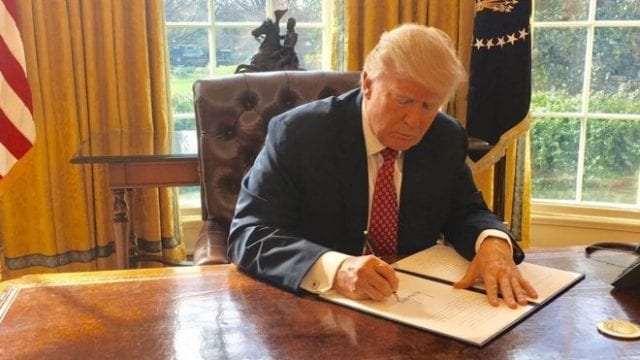Last week, a federal appeals court dealt yet another blow to President Donald Trump’s most recent rendition of a travel ban.
The unanimous decision, rendered by a three-member panel, won’t take immediate effect. A December verdict passed down by the Supreme Court is putting a hold on the power of subordinate bodies, preventing lower courts from ruling on the travel ban.
Only after the administration has been given time to appeal a pair of injunctions against the ban could the 9th Circuit Court’s directive take effect.
The contentious travel ban – now in its third form – limits visa issuances to the citizens of six Muslim-majority countries, as well as North Korea and the South American nation of Venezuela.
But, according to the 9th Circuit Court’s panel, such a sweeping restriction supersedes the president’s authority by arrogating the powers reserved by Congress.
“The Executive cannot without assent of Congress supplant its statutory scheme with one stroke of a presidential pen,” wrote the judges – all of whom, Politico.com notes, are Bill Clinton appointees.
“We conclude that the Proclamation conflicts with the statutory framework of the INA by indefinitely nullifying Congress’s considered judgments on matters of immigration,” the panel added. “The Proclamation’s stated purposes are to prevent entry of terrorists and persons posing a threat to public safety, as well as to enhance vetting capabilities and processes to achieve that goal….Yet Congress has already acted to effectuate these purposes.”

Unfortunately for immigration advocates, the opinion didn’t address some of the most contentious accusations levied against the administration. Foremost among them, mentions Politico, is whether the travel ban should be considered unconstitutional due to its apparent bias against Muslim would-be migrants.
Nevertheless, the three judges appeared to acknowledge those concerns.
“It cannot be in the public interest that a portion of this country be made to live in fear,” they claimed.
Although the 9th Circuit Court has ruled against Trump immigration policies several times since the president’s January inauguration, the judges didn’t go so far as to suggest the executive order be barred from total implementation. Instead, they made an argument that’s become commonplace in 2017 – that individuals with “bona fide” ties to the United States should be given the opportunity to travel or migrate.
What constitutes a “bona fide” tie to America became a serious concern for the courts over summer. While some questions remain, the accepted definition is one of concrete relationships – the presence of family members, an invitation from an employer or university, or an existing job.
During the days of the first travel ban, some men and women found themselves stranded overseas with visas which had been scrapped overnight and without prior notice.
A Justice Department spokeswoman said the agency was mostly content with the ruling, noting that the judges allowed the order to stand with only minor modifications.
“We are pleased that the Supreme Court has already allowed the government to implement the Proclamation and keep all Americans safe while this matter is litigated. We continue to believe that the order should be allowed to take effect in its entirety,” said spokeswoman Laura Ehrsam.
Sources
Appeals court rules against Trump travel ban 3.0
Trump travel ban back in court Monday
Trump’s New Travel Ban Blocks Migrants From Six Nations, Sparing Iraq
US President Donald Trump signs new travel ban, exempts Iraq


Join the conversation!